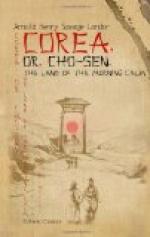The order to that effect being then given, two soldiers proceeded to help the man to rise. Calling to him was, however, of no avail. They had, therefore, to lift him up bodily, but when they tried to dress him they found his swollen bleeding legs to be as stiff as if they had been made of iron; wherefore, as they failed to bend them, two other men had to come to their assistance and carry him away. It not unfrequently happens in the case of this cruel method of flogging that a man’s thighs are broken and himself ruined for life, and many have been known to have even died under the severity of the punishment.
Imprisonment is not a favourite punishment with the Corean magistrates, for the infliction of such a penalty means considerable expense to the country, and would be but little punishment to the natives, who, by such confinement, would suffer little or nothing physically, and certainly not at all morally. Some, however, especially of the nobler classes, are kept confined, even for years, in expectation, for instance, of a sentence of capital punishment being carried out, or else in the hope that through influential friends they may obtain the royal pardon. As a rule, particularly with the better classes, exile is deemed a more impressive punishment than imprisonment, and when confiscation of land and property goes with this, the punishment is, of course, all the more severe.
Of banishment there are several different kinds. Thus, there is not only banishment from the city to a distant province, but also that out of the kingdom altogether. Some banishments are for short periods, others for longer periods, others for life. Banishment from the country is generally for life and accompanied by confiscation.
A curious custom prevails at Court, according to which, when a Minister, prince or magistrate incurs the royal displeasure, he is confined for two or three days to his own house, without being allowed to go out. Were the rule broken it would lead to serious trouble, for spies are generally sent to see that the rule is not transgressed. Such a punishment, mild as it is, is much felt by the nobles, and they take, therefore, a good deal of trouble to comply with the Court etiquette in all its minutest details.
Corean law is very lenient to women and children, or unmarried men, which latter class, as we have seen, are classified in the same category as the former. The head of the family is supposed to punish smaller offences as he thinks fit, either by rod or fist, the law only providing the severer forms of punishment for the bigger crimes.




